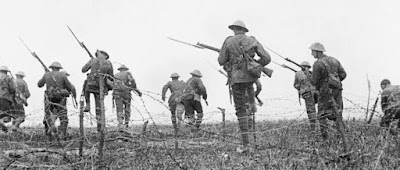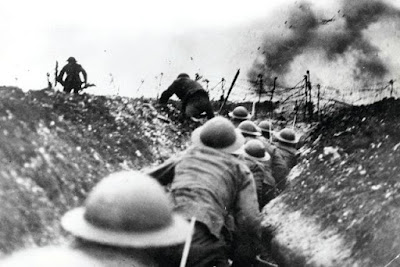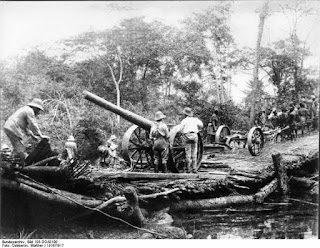And so it ended a hundred years ago today. 60 million Europeans had died, and many more in other theatres. It was a horrible, ghastly experience.
But had who had actually started it, what had it all been about, why was it fought in such a stupid manner, and what, if anything, was gained by victory?
These are not easy questions to answer, but some myths - many of which have passed into acceptance as 'facts' - can be quashed.
1. It was nobody's fault
That the First World War was a horrendous mistake is obvious enough. However that's not the same as saying it was nobody's fault. The trigger for the war was the assassination of Archduke Ferdinand and his wife by Serbian terrorists. In retaliation Austro-Hungary invaded Serbia. Now the Serbian military was connected with the terrorists, but the Serbian government wasn't, and Austro-Hungary had no evidence either way. In response Russia came to the aid of Serbia and in response to that Germany launched an invasion in France via Belgium.
In other words it was Austro-Hungary and Germany that started the war. Neither country was democratic. Both were absolute monarchies. Germany did have a parliament, but it was essentially powerless in matters of war. The German military meanwhile answered to nobody but the Kaiser. A small group of aristocrats and a few Generals then were responsible for the war. These were the guilty men.
And what about the guilt of the Triple Alliance? Russia didn't need to support Serbia, but why should they not have come to the aid of an ally that had been invaded illegally? Similarly, Britain did not need to come to the aid of Belgium. But again, why would she not? Both these invasions were also accompanied by the mass execution of civilians. To have not intervened would have been to accept injustice as the price of peace. Maybe that would have been a better deal, but we can't really blame the politicians of 1914 for not accepting it.
2. It was a war for capitalism
 The industrial revolution made the weapons of war more terrifying and destructive than ever before. It also made armies larger and - when they were not being killed or injured by enemy weapons - healthier than before. Bigger armies using more deadly weapons led to slaughter on a scale never before seen, but that is not the same as saying capitalism caused the war.
The industrial revolution made the weapons of war more terrifying and destructive than ever before. It also made armies larger and - when they were not being killed or injured by enemy weapons - healthier than before. Bigger armies using more deadly weapons led to slaughter on a scale never before seen, but that is not the same as saying capitalism caused the war.In neither of the empires that started the war did the bourgeoisie have any real political power. If they did they would almost certainly have stopped the war. Even before the fighting started the call up of so may men to arms nearly crippled the economies of all concerned. In the City of London the collapse of credit caused a financial crash that required a multi-billion pound (in today's money) bailout from the government.
Once war economies got going the capitalists made plenty of money from the war, but they did not cause it.
3. It was a war for empire
At least it wasn't a war for an empire outside of Europe. It's true imperial rivalries had led to tensions in the years before 1914, but these were mainly between Britain and first Russia and then France. However come the outbreak of hostilities these three nations went into battle as allies.
It's also true that Britain appeared to spend more time in the early years of the war trying to steal territory off Germany and Turkey than it did trying to win on the Western Front, but as Britain was only a reluctant participant in the conflict in the first place it's hard to see this as a motive. Of the counties that started the war, Austro-Hungary had no overseas empire and didn't want one, and what little of Africa Germany had it was more than willing to lose to secure domination in Europe. What's more there was no expectation that if Germany had beaten France they would have acquired any overseas French colonies. This didn't happen in 1870 and wouldn't happen in 1940. The French navy, operating from Algeria, would still have controlled the Mediterranean and the Royal Navy controlled everywhere else.
The existence of the European global empires is what made the Great War a World War, but empire did not cause the war.
4. Attacks on trenches always failed
 Service on the Western Front was a terrible experience for all concerned, but of all the myths of the
Service on the Western Front was a terrible experience for all concerned, but of all the myths of thewar perhaps the most prevalent is that the fighting itself was pointless. However the reality was not two armies flinging themselves pointlessly at machine guns and barbed wire for four years.
In fact most attacks on trenches were actually successful. Bloody, but usually successful. The problem was capturing the trench in front of you did not end the battle. Not only was there more than one trench line, but the main problem with the Western Front was that it involved huge armies fighting in a relatively small space. Wherever the enemy broke through, there were always reinforcement to counterattack, and defenders could arrive by train and get their faster than their attackers.
The result was a game of attack and counter attack that kept the front in almost the same spot for four years, but it wasn't quite as static as some people believe.
5. The fighting was pointless
 But what was the point of actually fighting? The first British casualty of the war, John Parr, and the
But what was the point of actually fighting? The first British casualty of the war, John Parr, and thelast, George Ellison, died within a few miles of each near Mons in Belgium, suggesting that the British army had spent four years fighting just to get back to where they had started. It was also clear, when the Great Power met to discuss the peace, that the world was in no way a better place in 1919 than it had been in 1914. So what was the point of fighting.
The point of fighting the war, rather bizarrely, was to end it. Once Germany's attempt to deliver a knock out blow to France failed on the Marne in September 1914 there was no way that the Central Powers could win the war. Unfortunately it took the four years, and a military defeat on the Western Front, to make them realise this.
Whilst any sensible leader would have seen the writing on the wall a lot sooner, the leadership in Berlin and Vienna were hardly sensible. As I said above, they are the guilty men.
6. It didn't matter who won
But if the only point of fighting the war was to end it, would it not have been simpler for one side to simply surrender so as to shorten the war. And if the other side wouldn't, then maybe we should have?
From the point of view of a Tommy in a trench this argument had a lot going for it. However in broader terms it falls down. Austro-Hungarian imperialism and German militarism started the war, and it is unlikely they would have been appeased by winning it. The Austrian empire was dying apart, but its leaders were determined to use force to keep it alive. The price of an Austro-Hungarian victory over Serbia would have been more conflict in the Balkans.
It's difficult to predict what a militaristic Germany would have done after victory. Some, mainly right wing, commentators imagine something rather like the EU. More realistic historians suggest further warfare would be more likely, as a victorious Kaiser would not have been satisfied just with Europe when the defeated power of France and Britain ruled most of the rest of the world. Perhaps he'd have fought them for their empires. Maybe he would have invaded China, as in a previous war he had boasted German troops would behave towards the Chinese as Attila the Hun had behaved towards the Roman Empire. Either way universal peace and brotherhood would not have been on the cards.
In the end the victorious allied powers squandered their victory. Their own unjust empires continued, with promises of greater independence broken. Germany was punished, but not reformed, and militarism was replaced by nationalism, which was hardly an improvement. But it was not all bad. The League of Nations was formed. The former European subjects of the Austro-Hungarian, Russian and Ottoman Empires gained their freedom.
The deaths of so many deserved much, much more, but their sacrifice was not pointless.



